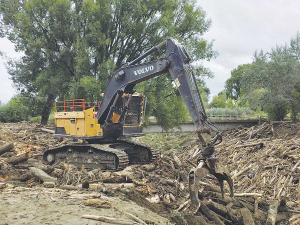Federated Farmers is calling for a government inquiry into the factors that contributed to recent flooding and smashed infrastructure in the Gisborne region during Cyclone Hale.
In the wake of Cyclone Bola in 1988, tens of thousands of hectares of trees were planted on highly erodible land in the province with the idea of stabilising slopes. But now those trees are being harvested for forestry, reexposing those slopes to erosion.
Feds national board member and former Gisborne- Wairoa president Toby Williams says that under current government settings, mass planting of exotics is being encouraged, especially in the Tairawhiti region.
“If this is all going to be harvested, there needs to be an urgent rethink on how and where we harvest to ensure when the next cycle of logging looms; we do not want a repeat these issues. Local ratepayers can’t afford the huge bill to repair roads and bridges year after year.”
Federated Farmers says in a letter to the Emergency Management, Forestry and Associate Environment Ministers LEO ARGENT that residual woody material/ slash left in situ after exotic forestry harvesting was a significant contributing factor to increased damage and needs to be part of the brief provided to the inquiry team.
In 2020, the Ministry for Primary Industries concluded a review of national standards for forestry identifying possible changes to the standards in conjunction with public consultations.
Although public consultations had officially ended, in a statement to Rural News Forestry Minister Stuart Nash said that he was “open to an independent inquiry into land management practices in the Tairawhiti district.”
Larger, more frequent storms are exposing current harvesting practices and the detrimental effects they are having on downstream catchments and communities. The region has seen at least 300mm of rain this month alone – a quarter of the area’s annual rainfall.
Several big players in the forestry industry have recently expressed support for an independent inquiry, with Eastland Wood Council chief executive Philip Hope noting that managing an area twice as big as Auckland with highly erodible soils but only 3% of the population was a “big challenge”.
Williams says that forestry operators are aware of the problems and have lifted their game.
“It’s not always someone’s fault when slopes fail. But if it is skid failure [temporary trails in logging areas] and things like that, then we have to ask questions about those practices that were supposed to have changed after the devastation of the 2018 storm,” he says.
“We need to get some inspectors up in the air and observe where all the debris has come from, and then what our pathway is going to be going forward.”
Nash says that forestry industries had been putting measures in place since the 2018 floods to reduce the impacts of future flooding.
“This includes retiring forestry blocks on land that cannot sustain any productive use allowing them to naturally revert, active replanting with natives [especially in] creek margins and greater management of slash and off cuts including chipping material sent to the Kawerau pulp mill.”
The letter to Ministers recommends holding meetings with Tairāwhiti landowners and residents and with Gisborne District Council.
“Gaining the community’s view on where they see themselves in the future will be key to improving the long-term economic, social and environmental sustainability of the region.”











